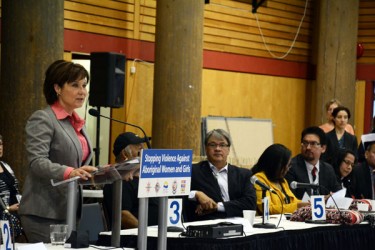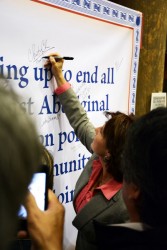Article Origin
Volume
Issue
Year
Beverly Jacobs knows what it would mean to end violence against Aboriginal women, but it’s too late to bring back her murdered niece.
On June 13, Jacobs was a witness to the signing of a memorandum of understanding (MOU) to end all forms of violence against Aboriginal women and girls. It was signed by leaders from the provincial government, including Premier Christy Clark, and Aboriginal leadership across British Columbia, including the BC-AFN, the First Nations Summit and Metis Nation-BC.
Jacobs, with the Ending Violence Association of B.C., has worked for years with Indigenous women and has heard many stories of violence, trauma, grief and pain.
“It’s all about the healing process and those steps that we need to take,” she said. “We are a very resilient people. We are very strong people. We have survived the worst. We have to empower those skills that we have to every single person in our community. We all have that responsibility.”
The MOU addresses key priorities, core relationship and implementation principles, intended outcomes and actions required as outlined by the government and First Nation organizations following years of studies and recommendations. Its intent is to end lateral, domestic and stranger violence committed against Aboriginal women and girls.
Regional chief of the B.C. Assembly of First Nations, Jody Wilson-Raybould, said the MOU signifies the tireless work done by women across the country to raise awareness about violence against women in the Aboriginal community.
“We’ll start as of today,” she said. “Concrete and comprehensive and inclusive action wherein we all as leaders and citizens take steps to ensure this is the first day that we will not ignore the voices of our women and girls across the country.”
Wilson-Raybould noted the MOU would also aid in overcoming the long “shadow of the colonial legacy,” as the province and First Nation communities worked collaboratively to identify this issue.
“We will recognize and address the root causes of violence against women and girls and recognize those root causes being poverty, inequality and marginalization,” she said. “This is the start of something impactful and the start of something that we, as First Nations, as a province, and as a country say ‘Enough is enough.’”
A necessary step in combating the impact of domestic violence is talking about it in public and providing an accessible way out, said Premier Clark.
“Domestic violence is something that happens almost always. It is hidden. It is a crime that its perpetrators make sure we never see,” she said. “Victims live with shame. They live with guilt. They live with the fear that if they speak out it will only get worse.”
At the meeting that drew a crowd of hundreds, Hugh Braker, chief councillor of the Tseshaht First Nation, said he was proud to see chiefs across the province come together with a shared commitment with the government to end violence against Aboriginal women and girls.
“I wanted to start by reminding everyone that if you look at the statistics, this morning, while we’ve been sitting here, somewhere in Canada an Aboriginal woman has been beaten,” he said. “If you look at the statistics, in the time that we have been sitting here this morning, somewhere in Canada an Aboriginal child has been abused.”
Braker noted that the Nuu-chah-nulth Nations have faced an ongoing struggle for the last 25 years since signing their own declaration to end violence against women.
“We’re able to look at the chiefs in the room and say, ‘You’ve got a long walk ahead of you,’” he added. “This is not something that a few words one day is going to cure. This is something that’s going to be a lifetime struggle for all Aboriginal people.”
The B.C. government has committed $400,000 to the Giving Voice initiative, which aims to help Aboriginal communities speak out and take action on the issue of domestic violence.
In February, the provincial government released the Provincial Domestic Violence Plan to span over three years. It’s attached $5.5 million to the project, including $2 million to fund programs for Aboriginal women, men and children affected by domestic violence.
Infamous tragedies in B.C., including the victims of serial killer Robert Pickton and the Trail of Tears victims in northern B.C., has placed the province in the dubious position as having the most suspicious Aboriginal women death cases in Canada, according to the Native Women’s Association of Canada. Most cases involve young women under the age of 31.
There are more than 1,100 cases of murdered and missing Aboriginal women over the last three decades in Canada, and 225 are still unsolved.
As Wilson-Raybould said: “We can do better” by putting action to words.
“We must do better for our women and girls,” she added. “I look forward to the hard work ahead.”
Photo captions: BC Premier Christy Clark addresses chiefs at the First Nations Summit after signing an MOU committing to work to end violence against Aboriginal women and girls.
Premier Christy Clark adds her name to a banner stating a commitment to end violence against Aboriginal women and girls.
- 3052 views


